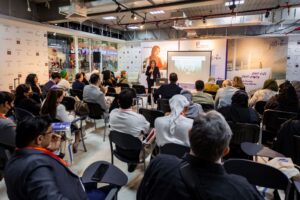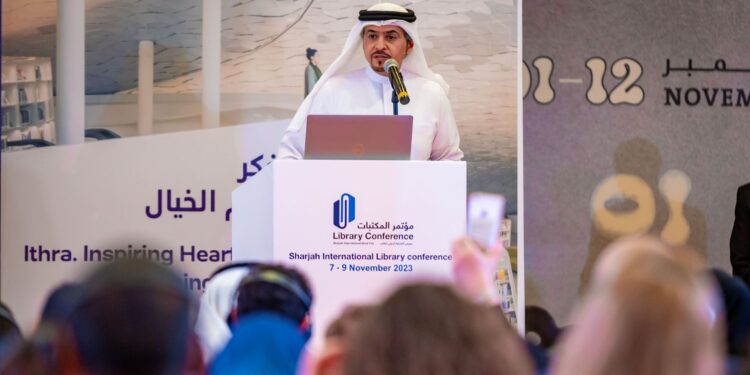Sharjah: The 10th anniversary edition of the two-day Sharjah International Library Conference (SILC) is underway
at the 42nd Sharjah International Book Fair (SIBF). Librarians, academics, and other industry
professionals from around the world are holding key discussions on this first-of-its-kind platform in the
region, and have turned the spotlight on the themes of sustainability, collaboration and emerging
technologies like artificial intelligence (AI) that are key to advancing this vital sector locally and globally.
The fruit of a decade-long collaboration between the Sharjah International Book Fair and the American
Library Association (ALA), SILC has crossed an important milestone this year in enabling the
professional development of librarians and those in related fields, and facilitating ideas and expertise
exchange.

Welcoming attendees to the conference, HE Ahmed bin Rakkad Al Ameri, CEO of SBA, said: “We take
pride in the fact that Sharjah is the only place hosting this conference outside the United States, in
collaboration with the ALA. We also take pride in the fact that we will soon celebrate the centenary of the
founding of Sharjah’s public libraries. We have achieved significant accomplishments in emphasising the
role of the library in building communities, welcoming over 700,000 visitors between 2019 and 2023 to
our public libraries in the emirate, offering over 6 million titles in 33 languages. We thank His Highness
Sheikh Dr. Sultan Bin Mohammed Al Qasimi, Supreme Council Member and Ruler of Sharjah, who made
books the cornerstone of human development.”
Describing Sharjah’s hospitality as nothing short of extraordinary, ALA President Emily Drabinski,
remarked: “This 10th edition of our conference is a momentous occasion, and provides us yet another
opportunity to collectively explore, learn and strategise ways we can continue to make libraries worldwide
even more wondrous. I wholeheartedly believe in the value of our work; in the power of collaboration,
connection and cooperation. It is a privilege to be in a place that truly understands the transformative
potential of libraries, its role in cultivating environments conducive to reading, and its nurturing endurance
in service of communities. Through reading, people are able to expand their horizons beyond their
immediate circumstances, envisioning diverse ways of being, knowing and exploring. If reading
represents a practice of freedom, then libraries stand as bastions of that very freedom. They possess the
ability to adapt and evolve, and through this conference we hope to make that evolution optimal.”
SILC 2023 receives in-depth insights from global library experts on emerging technologies,
sustainable knowledge models, climate action, and more
Officially commencing, after a full day of pre-conference workshops, the library conference is featuring
diverse discussions and debates on wide-ranging topics pertinent to shaping a robust future for libraries
worldwide.
Amongst over a dozen discussions that featured on the first day of the conference, one titled ‘AI and
Libraries: Impact, Challenges and Opportunities’ explored the impact, challenges, and opportunities
presented by artificial intelligence in libraries. Dr. Al-Anoud Subahi, Assistant Professor and Supervisor of
the IT Department at King AbdulAziz University in the Kingdom of Saudi Arabia, shed light on the history
of AI, its potential influence and application within libraries, and how librarians are utilising AI to enhance
various aspects of their work.
Expanding on the subject, Dr. Subahi said, “One practical use case of AI is locating a certain book within
the library or even recommending a book for a certain subject matter or genre. The power of AI can also
provide a personal experience for visitors using data about the books they have read in the past, curating
a reading list for them to read in the future. AI can also help greatly when it comes to cataloguing and
library databases, streamlining the process and making the library experience even better for both
visitors and library professionals. A more controversial use of AI is the process of writing books, as with
any new technology, it’s important to find a balance and not rely on technology completely. AI can be
used to help the writing process such as ‘Task Oriented Authoring Tools,’ but it will not replace the human
element, just as a calculator did not replace the mathematician.”
Technologies such as AI and robotics are also turning a new page within library spaces, and this was
demonstrated during a session titled ‘Artificial Intelligence and Multimedia facilities in school libraries:
Possibilities for the Future’ where Raghunathan. M.O, Senior Librarian at GEMS Modern Academy in
Dubai showcased an exciting robot assistant that can be deployed in libraries. This AI powered assistant
can provide a plethora of information including the location of certain books, recommendations for the
visitor, as well as summaries and more detailed information about a title. This opens a new world for
libraries and can provide a personalised service for every visitor.
Additional coverage of subjects such as enhancing the digital reading experience for the latest
generation, “Gen Alpha,” and shedding light on how libraries can adapt to their unique needs, the
conference also addressed the transformation of school libraries into vibrant learning resource centres,
recognising the exemplary efforts made by the UAE Ministry of Education to make this a reality.
Holding this important conference at the SIBF 2023 venue has also provided librarians and other industry
professionals an opportunity to visit exhibits by participants from 109 nations worldwide, meet with
authors and publishers to gain a wealth of insights and first-hand knowledge about the latest
developments in their sectors, their challenges and opportunities, and explore prospects for
collaboration.


































